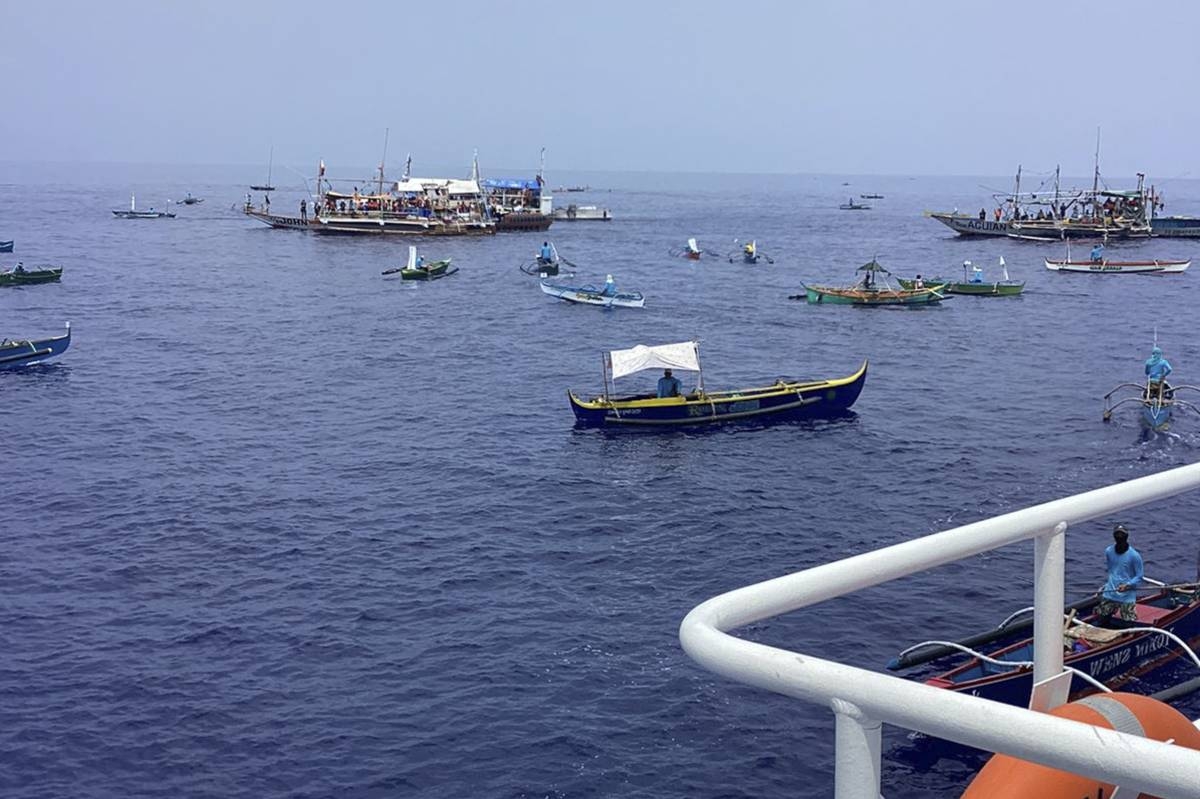The Disputed Waters of the West Philippine Sea
On a recent Wednesday, civilians aboard Philippine fishing boats set sail toward a China-controlled reef in the South China Sea. The purpose of their voyage was to distribute provisions to Filipino fishermen and assert their rights to the disputed waterway. This action comes in the wake of a recent incident where China coast guard vessels fired water cannons at two Philippine government boats in the same area, marking the latest maritime dispute between the two countries.
The convoy, consisting of around 200 individuals on five commercial fishing vessels and several smaller outriggers, was escorted by a lone Philippine coast guard boat. Their destination was the waters around Scarborough Shoal, a potential flashpoint since China seized it from the Philippines in 2012.
Reaffirming Sovereignty and Rights
As the convoy set out from a northern Philippine port, they began distributing food and fuel to Filipino fishermen at sea while dropping buoys marked “WPS is ours.” WPS stands for the West Philippine Sea, the name given by Manila to the waters immediately west of the Philippines in the South China Sea. The convoy’s spokesman emphasized that there was “no Chinese presence” in the area, although reports had indicated a heavy presence of Chinese vessels near the shoal.
According to organizer Edicio Dela Torre, the civilian supply mission was not only about delivering supplies but also about reaffirming the presence and rights of the Philippines in its own waters. Dela Torre stressed that the world was watching and that the narrative of rightful ownership and peaceful assertion was clearly on their side.
The Ongoing Dispute and International Tensions
China’s claims over almost the entire South China Sea, disregarding rival claims by the Philippines and other countries, have led to heightened tensions. This is further exacerbated by China’s deployment of coast guard and other boats to patrol the waterway and its militarization of several reefs in the area. Despite an international ruling that China’s assertion has no legal basis, Beijing continues to press its claims.
Manila’s pushback against China’s growing assertiveness has led to intensified tensions over the disputed waters and reefs. The recent civilian convoy to Scarborough Shoal was the second organized by the Atin Ito group, with a previous trip in December being aborted due to shadowing by Chinese vessels.
As the situation in the West Philippine Sea continues to evolve, the actions of civilian groups and government entities serve as a poignant reminder of the complex geopolitical dynamics at play in the region.
The Strategic Importance of the West Philippine Sea
The waters of the West Philippine Sea, also known as the South China Sea, hold immense strategic and economic importance for the Philippines and the surrounding countries. This region is a crucial maritime trade route, with an estimated $3.4 trillion worth of goods passing through it annually. It is also believed to be rich in natural resources, including oil and gas deposits, making it a highly coveted area for exploration and extraction.
However, the overlapping territorial claims by several countries, including China, the Philippines, Vietnam, Malaysia, Brunei, and Taiwan, have led to a protracted dispute over the control and management of these waters. China, in particular, has been increasingly assertive in its claims, building artificial islands and militarizing various reefs and atolls in the region.
The Impact on Local Livelihoods
The ongoing tensions in the West Philippine Sea have had a significant impact on the livelihoods of local fishermen, who have traditionally relied on these waters for their sustenance and income. The presence of foreign vessels, including military ships and coast guard vessels, has often resulted in confrontations and the restriction of access to fishing grounds, forcing many Filipino fishermen to venture into more dangerous or unfamiliar areas.
The situation has also affected the ecosystem and marine biodiversity of the region. The construction of artificial islands and the increased human activity have contributed to the degradation of coral reefs and other fragile marine habitats, which are essential for the sustainability of local fishing communities.
The Legal and Diplomatic Landscape
The Philippines has taken several legal and diplomatic steps to assert its claims in the West Philippine Sea. In 2013, the country filed a case against China at the Permanent Court of Arbitration in The Hague, challenging the legality of China’s “nine-dash line” claim, which encompasses a large portion of the South China Sea. In 2016, the court ruled in favor of the Philippines, declaring that China’s claims have no legal basis.
Despite this ruling, China has continued to disregard the decision and has even intensified its efforts to solidify its presence in the region. The Philippines, under the leadership of President Rodrigo Duterte, has adopted a more pragmatic approach, seeking to balance its relations with China and the United States while also asserting its sovereignty and protecting the interests of its citizens.
Regional Cooperation and the Way Forward
Resolving the disputes in the West Philippine Sea will require a multi-faceted approach, involving regional cooperation, diplomatic negotiations, and the adherence to international law. The Association of Southeast Asian Nations (ASEAN) has played a crucial role in facilitating discussions and negotiations between the claimant countries, and the recent developments in the Code of Conduct (COC) negotiations offer hope for a more stable and peaceful resolution.
However, the path forward is fraught with challenges, as the competing interests and nationalist sentiments of the various countries involved make it difficult to achieve a comprehensive and lasting solution. It is essential that all parties involved prioritize the principles of international law, respect for territorial sovereignty, and the sustainable management of the region’s resources to ensure the long-term stability and prosperity of the West Philippine Sea.
Source: The Manila Times








